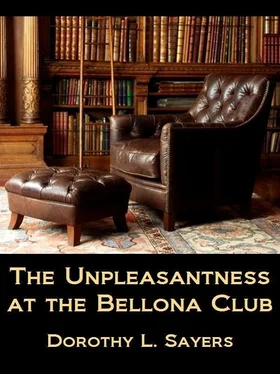“Quite so. Did she stay there throughout the interview?”
“I haven’t the least idea.”
“Well,” said Parker, patiently, “you can tell me this. When you went in with the brandy, the nurse was in the bedroom then?”
“Yes, she was.”
“Now, about the brandy. Nellie brought that up to you in the studio, she tells me.”
“Yes.”
“Did she come into the studio?”
“I don’t understand.”
“Did she come right into the room, or did she knock at the door and did you come out to her on the landing?”
This roused the girl a little. “Decent servants don’t knock at doors,” she said, with a contemptuous rudeness; “she came in, of course.”
“I beg your pardon,” retorted Parker, stung. “I thought she might have knocked at the door of your private room.”
“No.”
“What did she say to you?”
“Can’t you ask her all these questions?”
“I have done so. But servants are not always accurate; I should like your corroboration.” Parker had himself in hand again now, and spoke pleasantly.
“She said that Nurse Armstrong had sent her for some brandy, because General Fentiman was feeling faint, and told her to call me. So I said she had better go and telephone Dr. Penberthy while I took the brandy.”
All this was muttered hurriedly, and in such a low tone that the detective could hardly catch the words.
“And then did you take the brandy straight upstairs?”
“Yes, of course.”
“Taking it straight out of Nellie’s hands? Or did she put it down on the table or anywhere?”
“How the hell should I remember?”
Parker disliked a swearing woman, but tried hard not to let this prejudice him.
“You can’t remember — at any rate, you know you went straight on up with it? You didn’t wait to do anything else?”
She seemed to pull herself together and make an effort to remember.
“If it’s so important as that, I think I stopped to turn down something that was boiling.”
“Boiling? On the fire?”
“On the gas-ring,” she said impatiently.
“What sort of thing.”
“Oh, nothing — some stuff.”
“Tea or cocoa, or something like that, do you mean?”
“No — some chemical things,” she said, letting the words go reluctantly.
“Were you making chemical experiments?”
“Yes — I did a bit — just for fun — a hobby, you know — I don’t do anything at it now. I took up the brandy—”
Her anxiety to shelve the subject of chemistry seemed to be conquering her reluctance to get on with the story.
“”You were making chemical experiments — although Lady Dormer was so ill?” said Parker, severely.
“It was just to occupy my mind,” she muttered.
“What was the experiment?”
“I don’t remember.”
“You can’t remember at all?”
“NO!” she almost shouted at him.
“Never mind. You took the brandy upstairs?”
“Yes — at least, it isn’t really upstairs. It’s all on the same landing, only there are six steps up to Auntie’s room. Nurse Armstrong met me at the door, and said ‘He’s better now,’ and I went in and saw General Fentiman sitting in a chair, looking very queer and grey. He was behind a screen where Auntie couldn’t see him, or it would have been a great shock to her. Nurse said, ‘I’ve given him his drops and I think a little brandy will put him right again.’ So we gave him the brandy — only a small dose, and after a bit, he got less deathly-looking and seemed to be breathing better. I told him we were sending for the doctor, and he said he’d rather go round to Harley Street. I thought it was rash, but Nurse Armstrong said he seemed really better, and it would be a mistake to worry him into doing what he didn’t want. So I told Nellie to warn the doctor and send William for a taxi. General Fentiman seemed stronger then, so we helped him downstairs and he went off in the taxi.”
Out of this spate of words, Parker fixed on the one thing he had not heard before.
“What drops were those the Nurse gave him?”
“His own. He had them in his pocket.”
“Do you think she could possibly have given him too much? Was the quantity marked on the bottle?”
“I haven’t the remotest idea. You’d better ask her.”
“Yes, I shall want to see her, if you will kindly tell me where to find her.”
“I’ve got the address upstairs. Is that all you want?”
“I should just like, if I may, to see Lady Dormer’s room and the studio.”
“What for?”
“It’s just a matter of routine. We are under orders to see everything there is to see,” replied Parker, reassuringly.
They went upstairs. A door on the first-floor landing immediately opposite the head of the staircase led into a pleasant, lofty room, with old-fashioned bedroom furniture in it.
“This is my aunt’s room. She wasn’t really my aunt, of course, but I called her so.”
“Quite. Where does that second door lead to?”
“That’s the dressing-room. Nurse Armstrong slept there while Auntie was ill.”
Parker glanced in to the dressing-room, took in the arrangement of the bedroom and expressed himself satisfied.
She walked past him without acknowledgment while he held the door open. She was a sturdily-built girl, but moved with a languor distressing to watch — slouching, almost aggressively unalluring.
“You want to see the studio?”
“Please.”
She led the way down the six steps and along a short passage to the room which, as Parker already knew, was built out at the back over the kitchen premises. He mentally calculated the distance as he went.
The studio was large and well-lit by its glass roof. One end was furnished like a sitting-room; the other was left bare, and devoted to what Nellie called “mess.” A very ugly picture (in Parker’s opinion) stood on an easel. Other canvases were stacked round the walls. In one corner was a table covered with American cloth on which stood a gas-ring, protected by a tin plate, and a Bunsen burner.
“I’ll look up that address,” said Miss Dorland, indifferently, “I’ve got it here somewhere.”
She began to rummage in an untidy desk. Parker strolled up to the business end of the room, and explored it with eyes, nose and fingers.
The ugly picture on the easel was newly-painted; the smell told him that, and the dabs of paint on the palette were still soft and sticky. Work had been done there within the last two days, he was sure. The brushes had been stuck at random into a small pot of turpentine. He lifted them out; they were still clogged with paint. The picture itself was a landscape, he thought, roughly drawn and hot and restless in colour. Parker was no judge of art; he would have liked to get Wimsey’s opinion. He explored further. The table with the Bunsen burner was bare, but in a cupboard close by he discovered a quantity of chemical apparatus of the kind he remembered using at school. Everything had been tidily washed and stacked away. Nellie’s job, he imagined. There were a number of simple and familiar chemical substances in jars and packages, occupying a couple of shelves. They would probably have to be analyzed, he thought, to see if they were all they seemed. And what useless nonsense it all was, he thought to himself; anything suspicious would obviously have been destroyed weeks before. Still, there it was. A book in several volumes on the top shelf caught his attention: it was Quain’s Dictionary of Medicine. He took down a volume in which he noticed a paper mark. Opening it at the marked place, his eye fell upon the words: “ Rigor mortis, ” and, a little later on—“action of certain poisons.” He was about to read more, when he heard Miss Dorland’s voice just behind him.
Читать дальше












